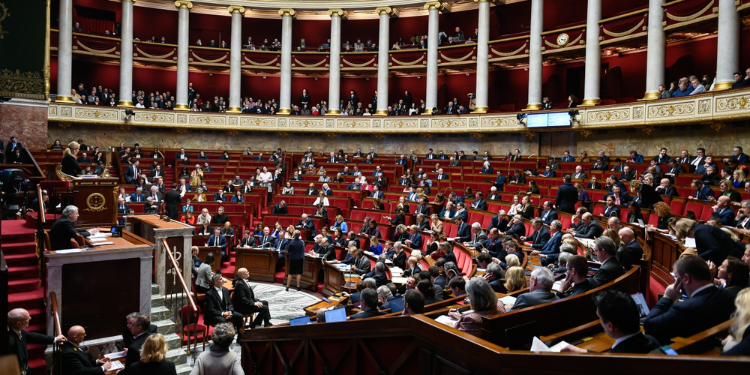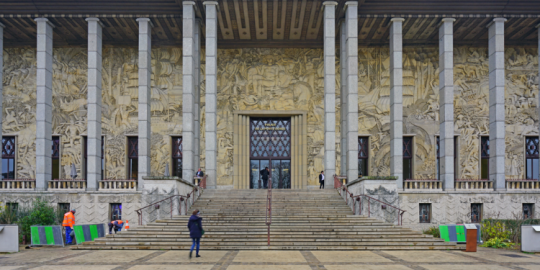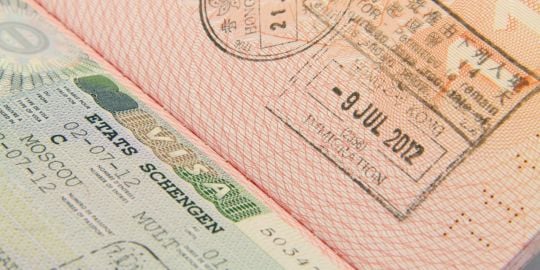The government applauds 2023 immigration figures
Economic immigration remains a priority, according to the 2023 immigration data shared by Interior Minister Gérald Darmanin on January 25. The figures reveal a 5% rise in residence permits for foreign workers, with permits for international students holding steady (+1%). In contrast, fewer permits were granted for family-related reasons (-5%). Overall, France has issued 1.4% more residence permits compared to 2022, totaling 323,260 permits. It's worth noting that these statistics exclude British nationals.
The regularization of undocumented workers rose by 5%. But Darmanin prefers to focus on deportations. These are up by 10%, with over 17,000 people deported. Among them is a large number of foreign offenders (+30%).
Becoming French is a more challenging goal nowadays. In 2023, the number of people acquiring French nationality dropped by 22%, reaching 61,640 individuals. This marks the lowest figure since 2018. The Minister of the Interior attributes this decline to the positive impact of "raising the level of French language proficiency required since 2020." While Moroccan and Algerian nationals continue to be the most common recipients of first residence permits, Chinese nationals experienced the most significant increase in one year (+31.1%), obtaining 14,930 first residence permits in 2023 compared to 11,388 in 2022.
The rise is less significant among Tunisian nationals (+2.5%, increasing from 21,860 to 22,400 permits) and Americans (+2.4%, going from 12,373 to 12,670 permits). The largest increase has been observed among Algerians, who secured 32,180 first residence permits in 2023 compared to 29,271 in 2022 (+9.9%). On the other hand, the situation is less favorable for Moroccan nationals who obtained 36,340 first permits in 2023, marking a 7.4% decrease from the 39,254 permits obtained in 2022.
Immigration law: The final twist
President Macron announced the "law to control immigration and improve integration" from India. The law, enacted on January 26, 2024, and published in the Journal Officiel the next day, hasn't brought an end to the debate. Instead, the Constitutional Council faced strong criticism. During their meeting on January 25, the Conseil des Sages censored 32 of the 86 articles in the law. Among them, 3 articles were either partially or entirely censored, and 2 are subject to reservations.
The Constitutional Council details its reasons in a decision that does not convince the right and extreme right. The Council refers to articles not in line with the immigration law. In particular, they refer to measures that would have tightened family reunification, reversed the "droit du sol" principle, or imposed stricter conditions for international students. Numerous measures submitted by the right, which had reached an agreement with the centrists with the support of the far right, were thus invalidated. As a reminder, on November 14, 2023, the Senate had voted on a much-revamped and tougher version of the immigration law. Right-wing senators had succeeded in removing what the government had presented as its flagship article: Article 3, which created a temporary residence permit for illegal immigrants working in sectors facing labor shortages.
Interior Minister Darmanin speaks of a "pragmatic compromise". Olivier Dusspot, Minister of Labour at the time, also spoke of a "step in the right direction". Everything seemed to be in place for the text to pass, even if it departs from the government's initial work.
Immigration law: The imbalance
How did we reach this point? In 2022, during his re-election campaign, President Emmanuel Macron unveiled his immigration reform plans. After winning the election, the project started to take shape. On November 2, 2022, Darmanin and Dusspot provided detailed insights into the immigration law project in an extensive interview with Le Monde newspaper. The ministers aimed to build the law on two key pillars: intensifying efforts against illegal immigration and introducing greater flexibility to promote integration. This "flexibility" included the notable article 3, which aimed to regularize undocumented immigrants working in sectors facing labor shortages at that time. The ministers characterized the bill as "balanced," and debates were scheduled for early 2023. However, article 3 quickly became the focal point, sparking sometimes virulent reactions.
The measure was embraced by left-wing circles as a matter of common sense. On the right wing, there were concerns about it being perceived as an "open invitation" for "massive immigration," with the argument that sectors grappling with labor shortages should prioritize hiring unemployed French citizens. On the other hand, companies facing shortages asserted that the French workforce is either insufficient or uninterested in the available job opportunities.
The pension reform
However, the immigration bill quickly took a backseat to another pressing issue during Macron's presidency: pensions. On January 6, 2023, Élisabeth Borne, then Prime Minister, introduced the pension reform bill, sparking extensive opposition. Despite unprecedented protests, with over a million demonstrators on January 31, according to the police, and approximately 2.8 million, according to the CGT union, the law was enacted on April 14, 2023. The Borne government utilized Article 49.3 of the Constitution to push through the legislation. Article 49.3, a tool used by Élisabeth Borne on multiple occasions, allowed the suspension of discussion on the law's text to pass without a formal vote. The reform officially took effect on September 1, 2023.
Immigration law: The latest twists and turns
In the face of the uproar over pension reform, the government stalled on its immigration law. Darmanin held more talks with an inflexible right-wing, still preoccupied with Article 3. Dussopt, an ex-socialist, disappeared from the scene. Darmanin, an ex-Republican, tried to reconnect with his former party cadres for arrangements and concessions. The bill resurfaced in the autumn of 2023, but no one could agree. The left wanted even more regularizations, and the right claimed more deportations and stricter measures against illegal immigrants. There was little debate on legal immigration or the government's programs to attract foreign talent (such as Passeport Talent).
On December 11, 2023, the National Assembly rejected the text previously approved by the Senate. It was a significant setback for the government and the president, who, however, was determined not to kick off 2024 grappling with the immigration issue. He pressed Borne to find a solution, even if it meant the text veering sharply to the right. This was achieved on December 19, following a series of final twists and turns. The right and far-right were pleased, with Marine Le Pen, leader of the far-right Rassemblement National, hailing it as an "ideological victory." Meanwhile, the left, along with associations and trade unions, strongly opposed the changes. The left appealed to the Constitutional Council. President Macron took responsibility for the decision and defended the ultimately adopted text.
A new twist came with the decision of the French Constitutional Council, which removed many of the tougher measures proposed by the right from the law. Macron took note and retained the essential: the Sages had validated most of the government's original project. He immediately promulgated the law.
What does this reform mean for expatriates?
On the side of "firmness," deportations and obligations to leave French territory (OQTF) will be made easier. This aspect was a fundamental component of the initial project. Previously, specific categories of foreign nationals, such as those who arrived in France before the age of 13, had greater protection. But this is no longer the case with the reform.
The well-known article 3 has not been reinstated in the law. Instead, the version that underwent tightening during parliamentary debates will be implemented. In the spirit of compromise, the government has embraced this revised perspective. From now on, prefects will have discretionary authority to determine whether or not to regularize undocumented workers in sectors facing labor shortages.
International students can sigh relief as the measures limiting their access to studies, such as quotas and return guarantees, have not been included. Still, they need to remain cautious. Some right-wing politicians are not accepting this outcome, and a few are even questioning the very existence of the Constitutional Council. Despite the reminder from the Sages that they only rule on the law, their decision is facing criticism. The immigration law continues to fuel debates, leading to bitter outcomes for the government. The presidential majority is now fractured and divided, with Borne losing her position. The left wing of the majority expresses regret over a text that compromises its values, prompting some members to leave the government. Those who remain in office aim to assert their influence on the implementation of the immigration law.
















